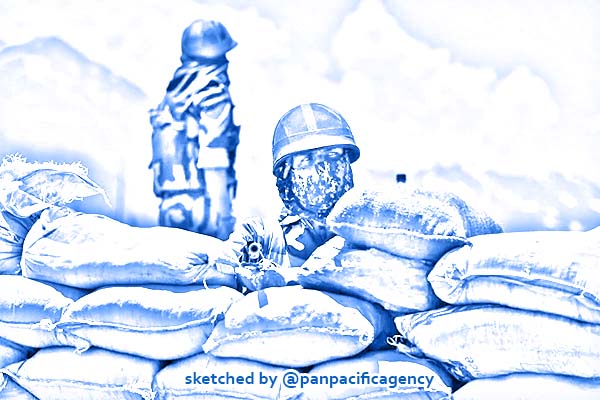India attacks China’s bid to ‘meddle in internal matters’

Indian soldiers guard a highway leading to the Ladakh region. Photo: DPA. Sketched by the Pan Pacific Agency.
NEW DELHI, Oct 16, 2020, The Asian Age. New Delhi lashed out at Beijing on Thursday, saying it “has no locus standi to comment on India’s internal matters”, after China reportedly said it doesn’t recognise the Union territory of Ladakh, The Asian Age reported.
China also doesn’t recognise Arunachal Pradesh as a part of India. In a veiled reference to China’s insistence that other countries follow the “One China Policy”, New Delhi “hoped countries will not comment on India’s internal matters, much as they expect the same of others”.
After the latest round of talks with China for military disengagement in Ladakh, India said Thursday the “two sides have a better understanding of each other’s positions”, adding that the two nations will “maintain the current momentum of communications based on the guidance of our leadership to not to turn differences into disputes and work towards a mutually acceptable solution for complete disengagement”.
On Thursday, MEA spokesman Anurag Srivastava said: “Our position on this has always been clear and consistent. The Union territories of Jammu and Kashmir and Ladakh have been, are, and would remain an integral part of India. China has no locus standi to comment on India’s internal matters. We hope that countries will not comment on India’s internal matters, as much as they expect the same of others. Our position on Arunachal Pradesh has also been made clear several times. Arunachal Pradesh is an integral and inalienable part of India. This fact has been clearly conveyed to the Chinese side at the highest level.”
On talks with China for military disengagement in Ladakh, he added: “I would like to draw your attention to the joint press release issued after the seventh round of the senior commanders’ talks held on 12 October. As indicated in the press release, the talks were positive and constructive. The two sides have a better understanding of each other’s positions. Disengagement is a complex process that requires redeployment of troops by each side towards their regular posts on their respective sides of the LAC. To achieve this, the two sides will maintain the current momentum of communications based on the guidance of our leadership to not to turn differences into disputes and work towards a mutually acceptable solution for complete disengagement.”